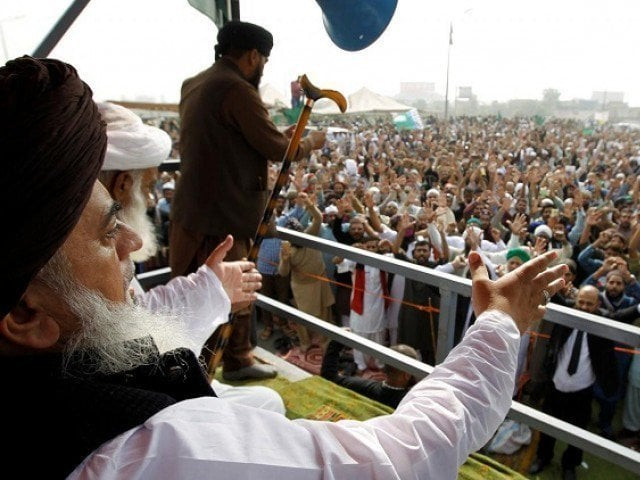IHC reserves verdict in Khatm-e-Nabuwat clause change case
In Oct last year, govt's move to 'simplify' a provision in the election form had led to a three-week sit-in...

Khadim Hussain Rizvi, leader of the Tehreek-e-Labaik leads members in shouting slogans during a sit-in in Rawalpindi, November 10, 2017. PHOTO: REUTERS
In October, the government's move to "simplify" a provision in the election form had led to a three-week crippling sit-in federal capital and the subsequent resignation of the federal law minister.
Justice Shaukat Aziz Siddiqui reserved the verdict for Friday after hearing arguments from petitioner and federation as well as several scholars and lawyers who had rendered their assistance in the case as amicus curiae.
The court had been hearing the petition on a day-to-day basis since February 20. Petitioner Maulana Allah Wasaya 's counsel Hafiz Arfat had maintained that the act relating to the declaration was against Article 8 and 227 of the Constitution and resulted in creating a serious law and order situation across the country.
The major developments during the course of hearings included the government’s submission of report of a committee led by Pakistan Muslim League-Nawaz (PML-N) Senator Raja Zafarul Haq on the controversy.
Election Act case: IHC wants 2017 census data on Ahmadis
On Wednesday, Deputy Attorney General Arshad Mehmood Kayani submitted the census data of 1981, 1998 and tentative data of the 2017. He also submitted the travel history of almost 6,000 persons, who obtained fresh passports after changing religious status from Muslim to Ahmadi.
Almost all the amicus curiae apprised the court that concealing real faith is a crime, and act of cheating and fraud with the state.
The amicus included professor at Institute of Islamic Studies, University of Punjab Dr Hafiz Hassan Madni, former member Council of Islamic Ideology (CII) Dr Mohsin Naqvi, member CII professor Dr Sahibzada Sajidur Rehman and Mufti Muhammad Hussain Khalil Khel.
Among the lawyers, Akram Sheikh, Dr Aslam Khaki and Dr Babar Awan assisted the court.



















COMMENTS
Comments are moderated and generally will be posted if they are on-topic and not abusive.
For more information, please see our Comments FAQ